The SSD Anthology: Understanding SSDs and New Drives from OCZ
by Anand Lal Shimpi on March 18, 2009 12:00 AM EST- Posted in
- Storage
PCMark Vantage
Next up is PCMark Vantage, another system-wide performance suite. For those of you who aren’t familiar with PCMark Vantage, it ends up being the most real-world-like hard drive test I can come up with. It runs things like application launches, file searches, web browsing, contacts searching, video playback, photo editing and other completely mundane but real-world tasks. I’ve described the benchmark in great detail before but if you’d like to read up on what it does in particular, take a look at Futuremark’s whitepaper on the benchmark; it’s not perfect, but it’s good enough to be a member of a comprehensive storage benchmark suite. Any performance impacts here would most likely be reflected in the real world.
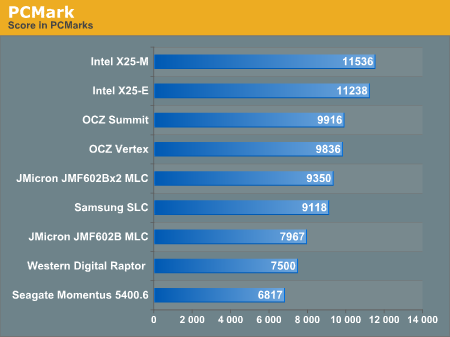
If you've paid attention to the synthetic tests from the previous pages, the results here should make sense. The Intel drives take the top two spots followed by the two OCZ drives, then the JMicron and conventional HDDs take up the rear.
While PCMark does do a great job of measuring disk performance, it doesn't seem to stress random write performance as much, allowing the JMicron drives to relax a bit.
Now let's look at the individual test suites:
The memories suite includes a test involving importing pictures into Windows Photo Gallery and editing them, a fairly benign task that easily falls into the category of being very influenced by disk performance.
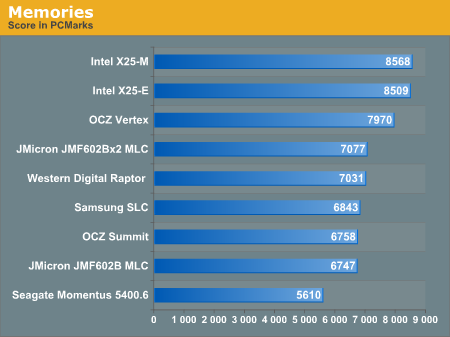
The TV and Movies tests focus on on video transcoding which is mostly CPU bound, but one of the tests involves Windows Media Center which tends to be disk bound.
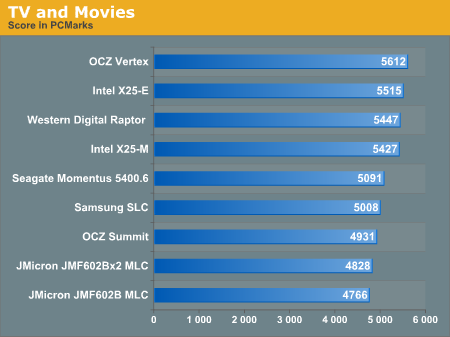
SSDs won't always dominate and in many cases they won't offer tangible improvements over a fast hard drive.
The gaming tests are very well suited to SSDs since they spend a good portion of their time focusing on reading textures and loading level data. All of the SSDs dominate here, but as you'll see later on in my gaming tests the benefits of an SSD really vary depending on the game. Take these results as a best case scenario of what can happen, not the norm.
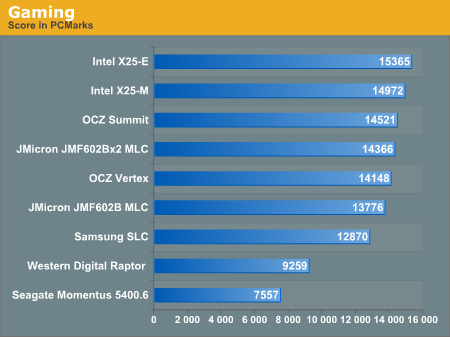
In the Music suite the main test is a multitasking scenario: the test simulates surfing the web in IE7, transcoding an audio file and adding music to Windows Media Player (the most disk intensive portion of the test).
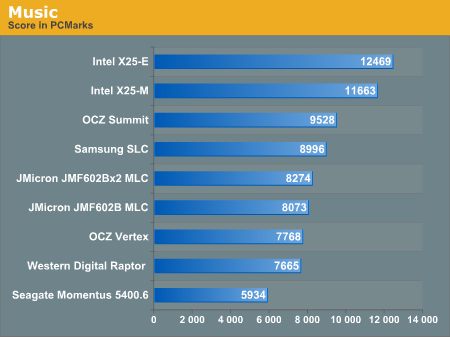
The Communications suite is made up of two tests, both involving light multitasking. The first test simulates data encryption/decryption while running message rules in Windows Mail. The second test simulates web surfing (including opening/closing tabs) in IE7, data decryption and running Windows Defender.

I love PCMark's Productivity test; in this test there are four tasks going on at once, searching through Windows contacts, searching through Windows Mail, browsing multiple webpages in IE7 and loading applications. This is as real world of a scenario as you get and it happens to be representative of one of the most frustrating HDD usage models - trying to do multiple things at once. There's nothing more annoying than trying to launch a simple application while you're doing other things in the background and have the load take seemingly forever.
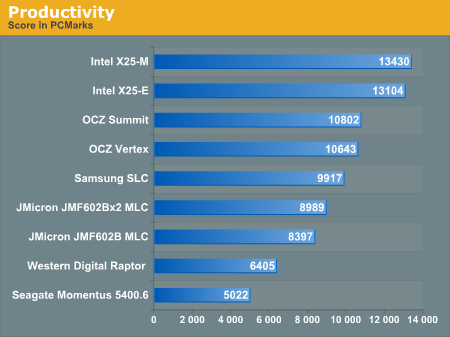
The results here are the best characterization of my personal experience with the drives. The Intel drives are the fastest, a good 25% faster than the Summit or Vertex. Next up are the OCZ drives, with the Vertex dangerously close to the Summit. The older Samsung SLC is next in the standings, followed by the JMicron drives. There's a healthy combination of reads and writes going on here which benefits all of the SSDs, including the less desirable ones.
The final PCMark Vantage suite is HDD specific and this is where you'll see the biggest differences between the drives:
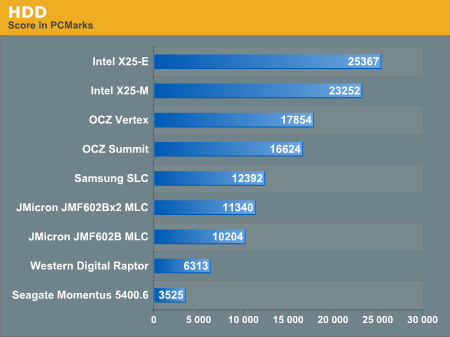
Again we're seeing the sort of breakdown we'd expect. The Intel drives come out ahead, while the Vertex is the best bang for your buck.










250 Comments
View All Comments
coil222 - Wednesday, March 18, 2009 - link
Yes I run a pair of MTRON 7500s in a raid 0 stripe for my OS and Gaming (wow). I don't recall numbers off the top of my head but tests were better on the raid 0 than a single drive configuration.Watch this:
http://www.youtube.com/watch?v=96dWOEa4Djs&fea...">http://www.youtube.com/watch?v=96dWOEa4Djs&fea...
sawyeriii - Wednesday, March 18, 2009 - link
I just wanted to state how much I loved the combination of technical and real world information in this article.What is the possibility of having different page sizes built into a drive? I.e. you could have a drive with many 1k page packages on one die, 2k on another, and most others 4k. Could that theoretically help? Could the controllers work with that (or would you need to combine multiple 1k's into a 4k transfer size)?
PS One note on page 3, the VelociRaptor and Intel in the first chart (responce time) are switched, however the text is correct.
StormyParis - Wednesday, March 18, 2009 - link
the ugly truth is that an SSD won't let you do anything that you couldn't do without it, and due to its cost and small capacity, it's not a replacement drive, it's an extra drive: not less power consumption but more, not less noise but just the same. You just gain a bit of time when booting up and lauching apps... which I do about 1/week and 1/day, respectively. Assuming your system has enough RAM (and if it doesn't, buy RAM before buying an SSD !), you won't feel much difference once the apps are launched.For the same cost, I'd rather buy a bigger screen.
It's urgent to wait for prices to come down. But I'm all for lots of people buying them now and help get the price down for us wiser buyers.
Rasterman - Thursday, March 19, 2009 - link
I've already decided my next system in a few months will have one, after you go through 5 hard drive failures (over several years) lets see how much your willing to pay to not have to put up with it anymore. If you use your PC for anything useful (work) then an SSD is a no brainer even at $1000/64GB IMO if the data security is there, speed is secondary for me.When you already have the best screen, video card, memory, why not have the best drive? And your argument is pretty dumb, almost any upgrade won't let you do anything that you couldn't do without it, not just SSDs.
Calin - Wednesday, March 18, 2009 - link
You get lower power due to the lower power use of the SSD and the fact that the other drive is not stressed with difficult access patterns (small random reads/writes). Remember that idle power of a SSD drive is very low7Enigma - Wednesday, March 18, 2009 - link
No, his comment was accurate for most users. Due to the small capacities and high cost these will be used as boot drives primarily with maybe a single heavily used program (say the current game or program you are playing/using), the rest will be on an additional drive. So while the power consumption of the SSD would be less than the old drive, the aggregate power usage of both (even when the larger storage drive is primarily at idle) will be higher than the single HD.And I believe you meant to say traditional HD for idle power?
strikeback03 - Wednesday, March 18, 2009 - link
If all you were going to throw on the drive is the OS and a game, a 32GB drive should be plenty. The reason the 80GB and up range is important is so general consumers can load all their programs on it.But yes, in consumer usage other than a laptop, some people who were previously using one drive for both boot and storage would likely need a mechanical HDD is addition to the SSD. OTOH, those who were using a Velociraptor (or RAID array) for boot and another drive for storage will see their power consumption decrease.
sawyeriii - Wednesday, March 18, 2009 - link
Have you used a SSD? (If so which)I would state that it is not a luxary product, it is a premium product. The price difference you pay WILL translate to faster performance (if you choose correctly). More RAM only helps upto a point.
Remember performance is based on a system of parts...
CPU
RAM
NORTHBRIDGE
GPU
SOUTHBRIDGE
I/O INTERFACE
HDD/SDD
Microsoft's Windows Experience Index has specific flaws, but the concept is sound... The system can only go a fast as the slowest component in the system (relative to the amount of time used by that component).
Testtest - Wednesday, March 18, 2009 - link
... there's also Supertalent's Ultradrive ME (MLC) and LE (SLC) and Photofast's G-Monster v3At least the Supertalent drives are quite a bit cheaper with the same drive layout/controller than the Vertex drives and only differ in the firmware (which isn't bad either).
It's however possible at least with the Ultradrive ME currently to provoke a kinda timeout error after they've been fully filled once and then still beeing written on. I don't own a Vertex so I can't test that there but if it was a controller issue, it should pop up there sooner or later as well (if you take a look in their suppport forum some error reports seem very similar).
Intels have their 80% bug, Indilinx drives have their issues too it seems - let's hope that firmware can cure it!
Great article btw!
iwod - Thursday, March 19, 2009 - link
Both SuperTalent and OCZ 30 / 32 GB drive cost exactly the same on NewEgg$129